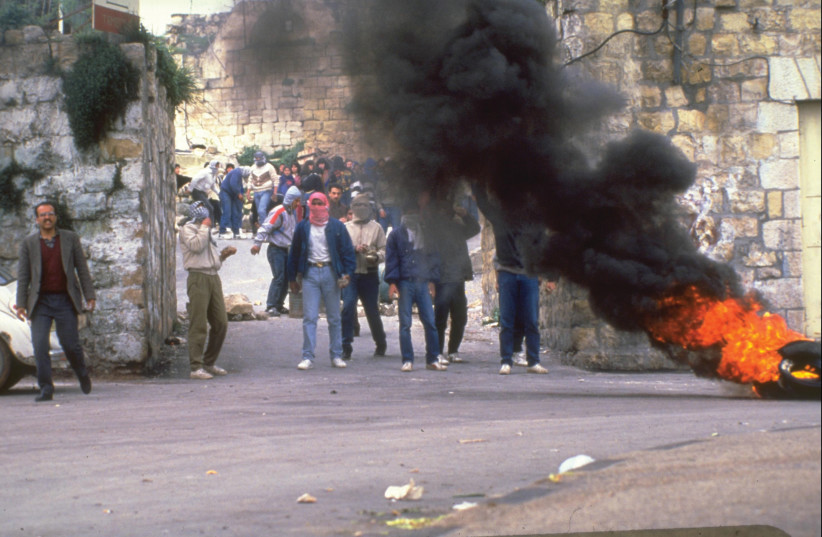The fear is real. It is justified. The uptick in terror is real. Day-to-day life is peppered with terrorist attacks, and the anxiety levels of Israelis rise higher and higher. Of course, it is a natural reaction, a gut reaction.
But it is not an intifada. The authorities have not labeled it an Intifada and I do not think that they will. I do not think that they should.
This is nothing like the First Intifada (December 1987-1993) that ended with the signing of the Oslo Accords. This is nothing like the Second Intifada which was called the al-Aqsa Intifada (September 2000-2005).
In colloquial terminology in Arabic, Hebrew and even English, “intifada” means “revolt.” The common definition understands intifada as a popular uprising, predominantly of youth.
While the term intifada had been used periodically since 1950, it was not a popular word or descriptive term. It did not come trippingly off the tongue until December 1987.

Now it has become a common word in Arabic and Hebrew and again, even in English. It was unusual for the word to be heard at all until Palestinians began using it to define the acts of terror they were perpetrating during the First Intifada.
The Arabic root of the word is “nafada” which means to shake, as in to shake off something. It is “shaking” as opposed to “quaking” which, somewhat ironically, is the meaning of haredi or “harad” in Hebrew.
Simply put, Palestinians chose to call their actions “intifada” because the message they were sending is that they intended “to shake off the oppressive Israeli occupation.”
The First and the Second Intifadas were so different from what is happening today in so many ways.
The intifadas were coordinated through the offices of Yasser Arafat. They were funded, recruited, organized and strategized by PLO leadership, most notably by Marwan Barghouti, who is now languishing in an Israeli prison cell.
Arafat funded the intifada as a tool to get the world’s attention fixed on his slice of land. He used terror to influence Israel and the world. Albeit an extremely flawed framework, the Oslo Accords did bring about the end of the First Intifada.
During both intifadas, terror attacks against Israelis appeared to be spontaneous. The riots and stonings seemed to simply emerge – what today we would call pop-ups. Drive-by shootings appeared haphazard.
But that was just a carefully constructed illusion.
THEY WERE planned. They were tactically arranged. They had specific strategic objectives. Terrorists and rioters were paid. There were organizers. There was a hierarchy. There was accountability to higher officers. And it all began and ended with Yasser Arafat, who would personally stuff cash into envelopes and dole out the payments.
Today’s Palestinian leadership does not have the ability to organize any significant network. Today’s Palestinian leadership can in no way mimic the organizational structure that Arafat and Barghouti had put in place.
What is happening today really is haphazard, not just the illusion it was once made out to be. Many of the attacks are perpetrated by lone wolves, often taking action after having been motivated by ISIS-type websites. And then there are copycats.
Today, even if masses of youth agree with the attacks, they are not running out to join a movement of terrorist attackers. They are not signing up to perpetrate other attacks or rushing out to join massive protests.
Just like the attacks of yesteryear are not the attacks of today, the Palestinian youth of the First Intifada and the Second Intifada is not the Palestinian youth of today. There is a full generation and a half difference between the youth of 1987 and the youth of 2022.
The youth of today would rather play computer games. Even if Palestinian leadership closed schools for a day and organized a massive protest most Palestinian children would stay home and play video games. That’s not an assumption, it’s been proven. That was exactly what happened when Hamas attempted to rally the youth and rile them up to face Israelis in massive protests. Hamas was sadly disappointed by the turnouts.
Abbas and his cadre of Palestinian leadership have not connected with Palestinian youth. Young Palestinians do not believe that Mahmoud Abbas cares about them and their issues. Abbas and his minions are totally disconnected from the younger generations.
Say and think whatever you want about Marwan Barghouti, he was loved and admired by Palestinian youth and the working masses.
Barghouti was not perceived as part of the hierarchy of the PLO. He never wore a suit and never wore a tie. He acted and dressed like any and all Palestinian workers. He looked like the quintessential truck driver. That was the image he cultivated. And he led every protest. And he stood at the head of every march.
I’ve always called Marwan Barghouti an anti-intellectual–intellectual. His image was that of a down-to-earth working-class person. In reality, Barghouti was the brains of the Intifadas, he was the organizer. Barghouti was so successful that Arafat was jealous of him. So much so that Arafat once pulled his revolver on Barghouti during a meeting. Knowing Arafat all too well, Arafat’s bodyguards had earlier removed the bullets from his gun.
Abbas is not Arafat. And no one in the PA leadership comes close to resembling Barghouti. Only after Palestinian leadership gains the respect of their youth, only after they appoint a dynamic leader can there ever be another, a third, Intifada.
That does not, however, change today’s reality and the frightening uptick in terror.
The writer is a social and political commentator. Watch his TV show Thinking Out Loud on JBS.
